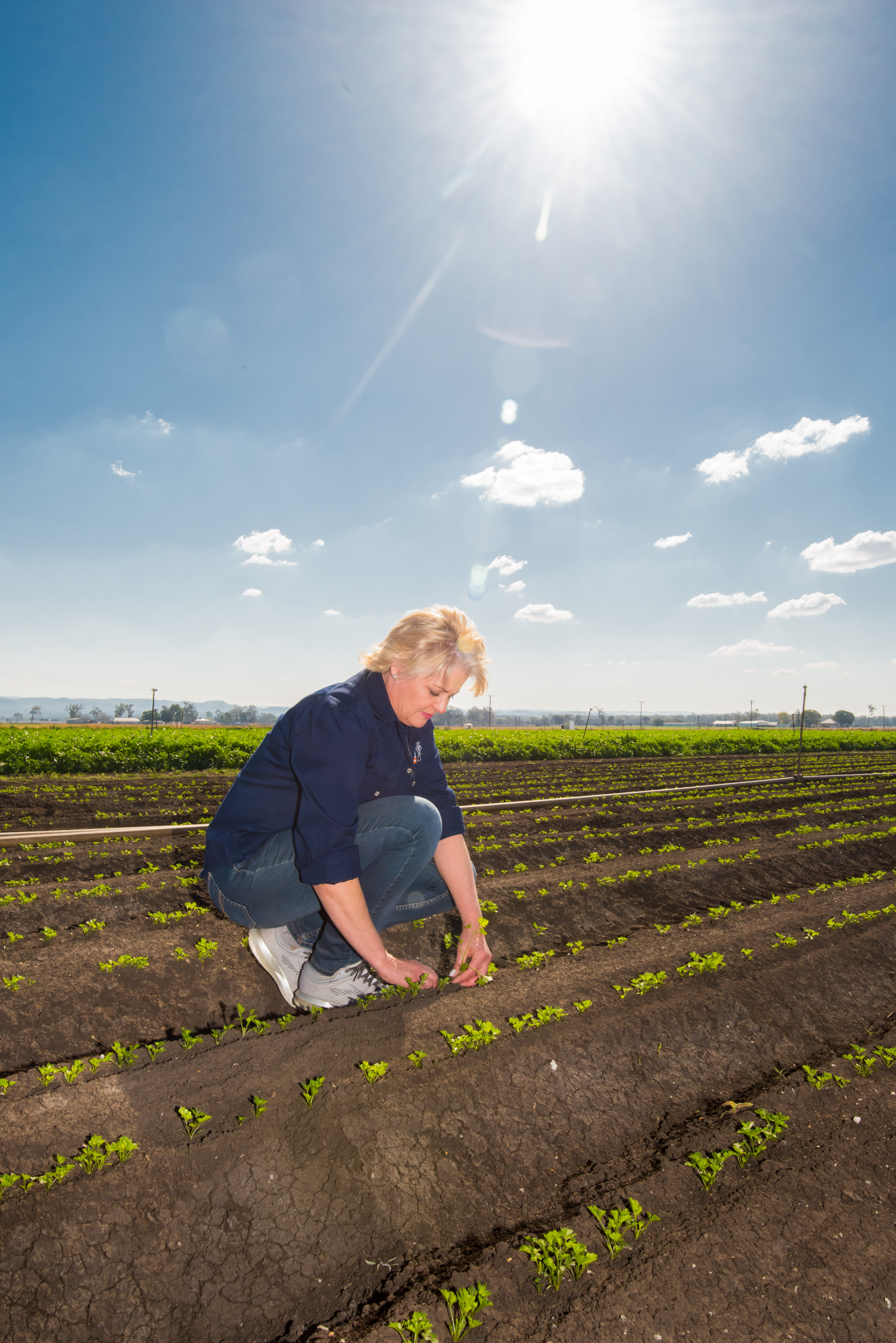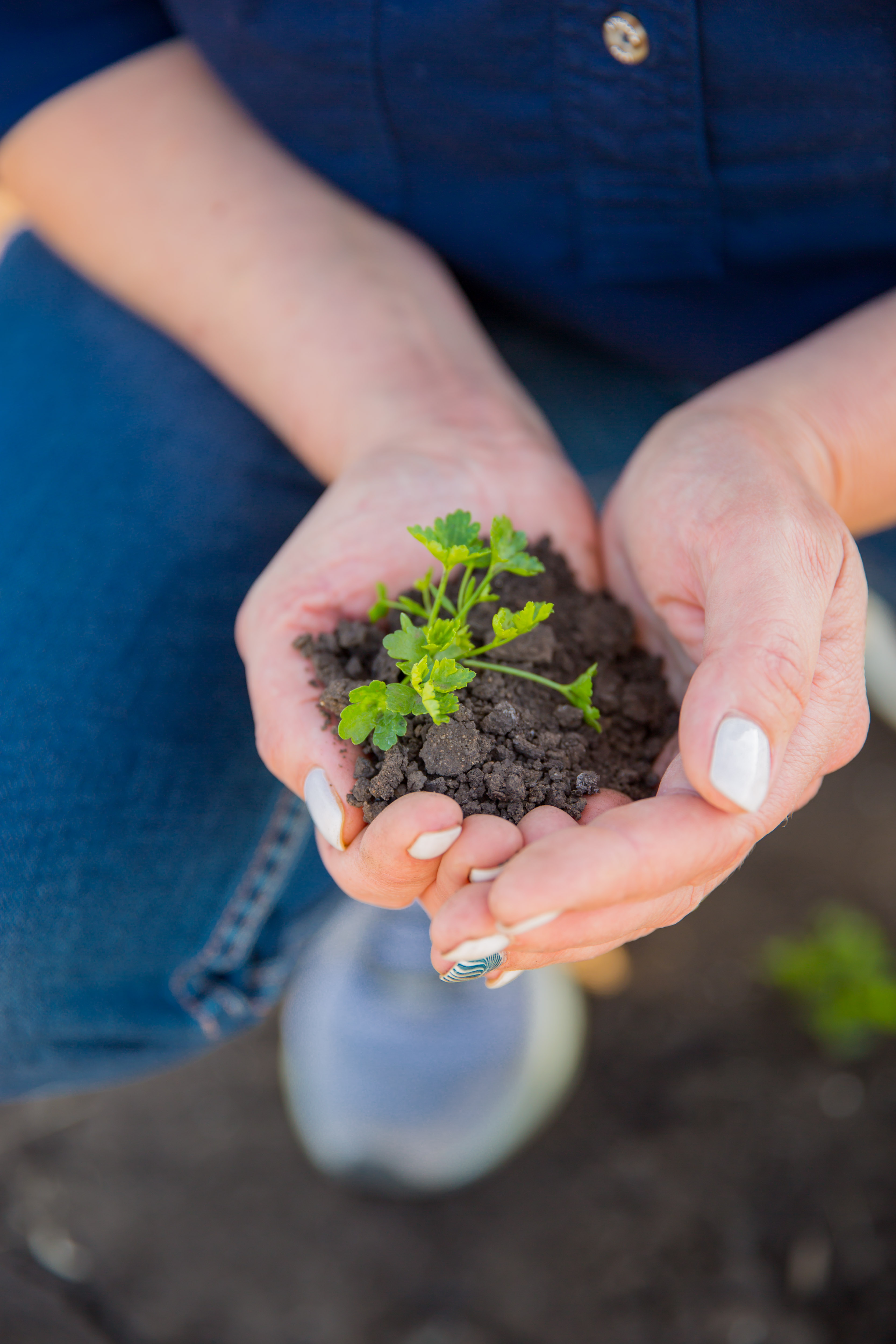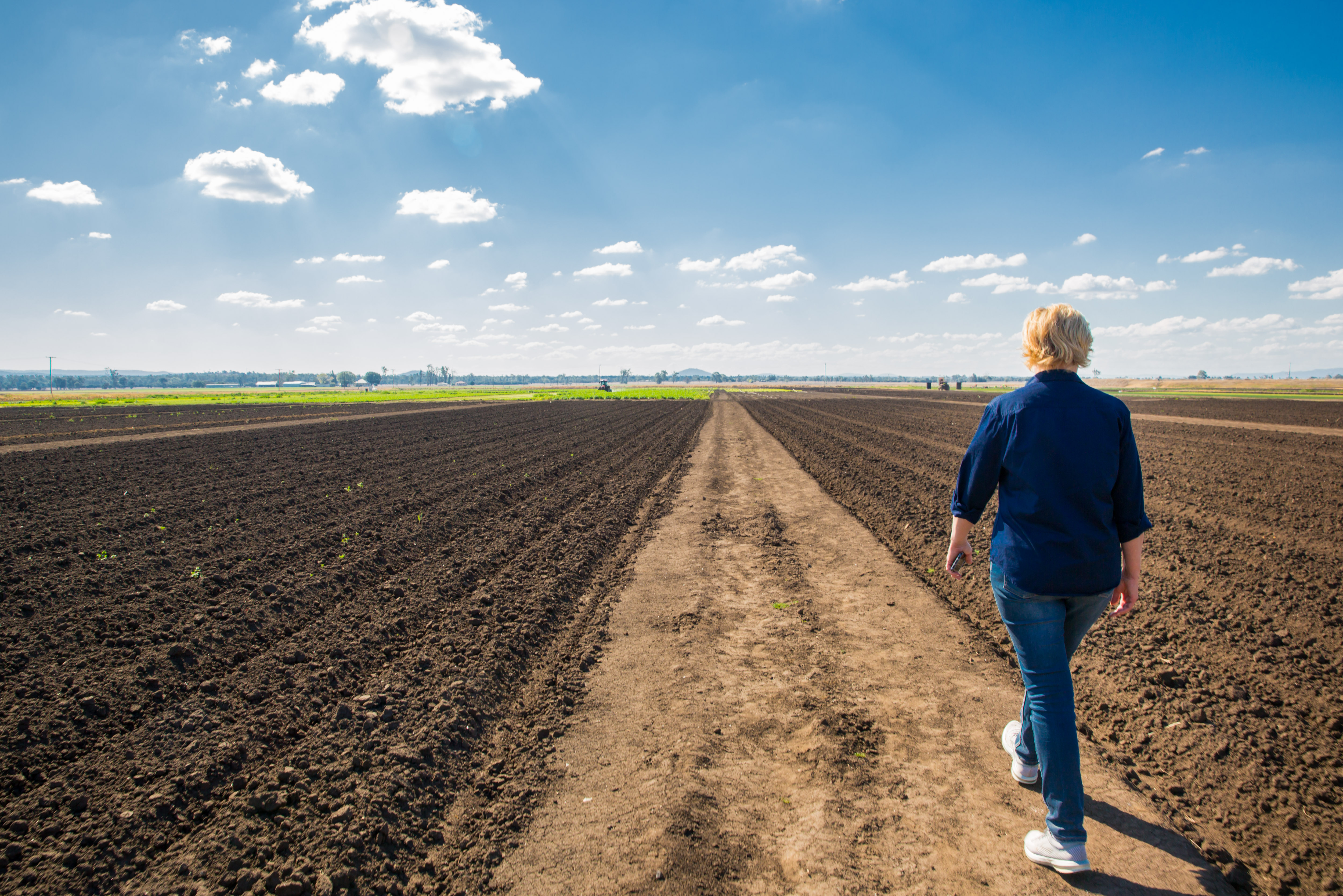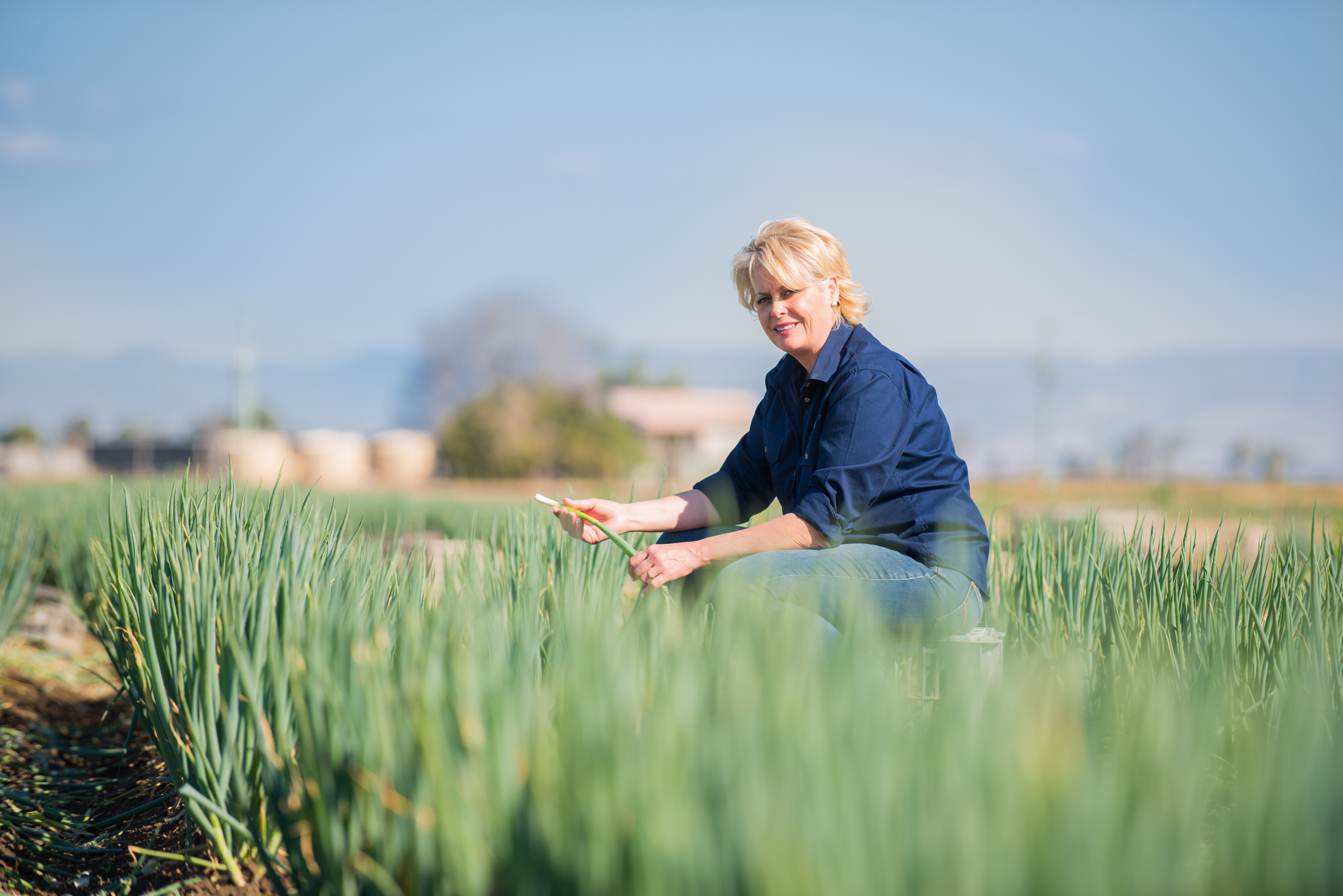From city to farm: Janne Dipple brings a new perspective to horticulture
Born and bred in the city and hailing from a corporate background, Janne Dipple did not follow a traditional route into the farming industry. However, sometimes a person with a different background, perspective and experience is all that an industry needs to innovate and improve.
Fast facts
Name: Janne Dipple
Location: Gatton, QLD
Works: FarmReady Hub & Bare Essentials
Role: Founder & Director/Owner
You wouldn’t expect to cross paths with a farmer in a ballroom dancing studio, but that’s exactly where Janne Dipple met her now-husband Brendan – and so she began her transition from corporate Sydney to the world of production horticulture in Queensland’s Lockyer Valley.
Brendan, who holds a silver medal in the sport, is a fourth-generation farmer and Operations Director of Bare Essentials, which produces leafy green vegetables and herbs in Morton Vale, near Gatton in south-east Queensland.
Janne’s chance meeting with this farmer wasn’t her first brush with the agriculture industry either. Despite growing up in Sydney, Janne spent much of her childhood with her extended family in central New South Wales on their wheat, sheep and dairy farms.
“I always had that ‘two world’ thing going on and I really enjoyed agriculture,” Janne recalls.
“My interpretation of what farming was, and what I was about to marry into, was a lot different to what it actually is because I didn’t understand the difference between broadacre farming and production horticulture, which is much more intensive. I just had to put my skates on and get on with it.”
And put her skates on, she did.
Janne was thrown head-first into the small farming business, where she did her best to help out on an operational level. She soon learnt that you can take the girl out of the city, but it’s much harder to take the city out of the girl – and so Janne turned her mind to the ways in which she could make the most of her corporate background and experience in training and employment, and apply it to the farm and the wider industry.
Skills transition
Once she had implemented quality assurance procedures, OH&S and employment plans into Bare Essentials, Janne took on the role of Business Manager at Story Fresh, where she learnt about the challenges of a large farming business in production horticulture.
Eventually the extensive travel to the office took its toll and Janne started work at the University of Queensland’s Gatton campus as a trainer for agricultural business units. She worked her way up the ranks and built upon her skillset until she eventually became the Operations Manager at the campus.
During her time at the university, Janne came across the Lockyer Valley Alliance’s FarmReady Card. The University of Queensland administered this industry-level program, which involved an induction where participants received a card and a skills passport to prepare them to work in agriculture.
When funding for the program dried up in 2005, Janne recognised a new opportunity.
“In my early twenties, I worked in shearing sheds, around livestock and cropping in a very arid farming environment. Listening to family farming issues and hardships, I developed an interest in the day-to-day challenges of a farm. I then dealt with issues on my own vegetable farm and increasing legislation requirements – it’s always been hard to find staff with the right skills and personal attributes.
“Then I worked in vocational education and started to understand how our training options are developed and delivered and those constraints. Following my job in education, I also worked in a government role investigating the needs of agricultural employment and training. By the time I finished this job, I was convinced of what I thought was needed.
“Agriculture is so diverse; no two farms are the same and therefore training needs and staffing needs vary between commodities, and individual farms. This is further exacerbated by many workers moving into regional areas to experience farming for the first time and being employed in bulk during peak season where farmers just don’t have the time to manage it all. We have pressing legislation requirements and can only diversify and flex so far.
“I felt the need to do something because I could see there was no interconnection between all the silos on the pathway to employment and training in agriculture.
“I met with the Lockyer Valley Alliance and suggested that we reinvigorate the FarmReady Card and blow the dust off it to sophisticate it into today’s needs. We couldn’t get the funding, so I bought the IP for it and created a private company.”
"Agriculture is so diverse; no two farms are the same and therefore training needs and staffing needs vary between commodities, and individual farms."
A new era
In March 2017, Janne launched FarmReady Hub, which issues the FarmReady Card. This service earned her a position as a Queensland finalist in the 2018 AgriFutures Australia Rural Women’s Award and a finalist in the Hort Connections 2018 Women in Horticulture award.
The hub is designed to provide everything that a potential worker needs to have and know prior to arriving on-farm. It is industry preparation training, and an information gathering tool supported by a two-year membership.
“When a job seeker arrives for their first day of work, they have their employment paperwork ready, are dressed appropriately, have an idea of what the work looks like, are connected to quality accommodation and understand living in country Australia. The job seeker also receives training on industry basics – underpinning the employer’s on-farm induction and training responsibilities. I’ve tried hard to ensure that employers and farmers receive the knock-on benefits of streamlined employment and induction processes for free,” Janne explains.
“After a job seeker completes the training modules and receives a score of 100 per cent, they are issued with an electronic FarmReady Card as proof of their membership. This card can be shown to other industry providers to receive discounts or to employers to prove their successful completion of the training.”
While the website farmreadyhub.com has been offline recently due to a redesign of the original prototype, it is due to reopen for business in early 2019. Starting in the Lockyer Valley, Janne says the service can be easily applied to any region in Australia, across all agricultural sectors.
“FarmReady’s ethos is to find solutions through a community approach and provide a platform that benefits everyone, from the job seeker to industry providers as well as educators and employers. It isn’t about replacing services that are already out there; it’s a linking service – a hub. If there are any employers or industry providers keen to connect, just get in touch via email from the website,” she explains.
“The FarmReady Hub website is marketed towards backpackers as they make up the majority of transient workers, however it is suitable for anyone, whether they are Australians, migrants, students or seasonal workers.”


Going back to school
While FarmReady Hub is accessible online and through a mobile app, Janne realised she was missing one more essential element: face-to-face engagement, ideally within a workplace, which is often lacking in current agricultural training.
So, when the opportunity came up to purchase the former Plainland Schoolhouse, which dates back to 1886 and housed the local Country Women’s Association since 1968, Janne quickly embarked on a two-year mission to purchase the building and transport it onto the farm.
“Now I can use that old schoolhouse to run training and education on-farm and bring all my worlds together – training, education, employment and farming,” she says.
The new ideas haven’t stopped there. Janne has plans to build a commercial kitchen within the schoolhouse for training and other projects, as well as an agritourism component to promote the local region and its produce. She is also keen to conserve and revegetate the surrounding area of the farm that was damaged in the 2011 floods so it can provide a safe haven for rare and endangered species, as well as welcoming surroundings for visitors.
There seems to be no shortage of new ideas for this innovative woman in horticulture, and she has realised first-hand the unlimited potential of working in the industry.
“I like the diversity – there is something in horticulture and agriculture for everybody. I think that women in the industry also bring a different perspective,” she says.
“In any modern business, no matter what it is, you have to cover a lot of skillsets. I think that’s where having men and women in horticultural enterprises really works well because you’re more likely to cover more of those skills and bring in new ideas.”
Clearly, this city-girl-turned-horticultural-entrepreneur is living proof of that very fact.

This profile first appeared in the leading magazine for the Australian potato industry, Vegetables Australia. If you’d like to subscribe to receive a new edition of Vegetables Australia in your mailbox every two months, use our online subscription form!
Photography credit: Anna Osetroff

